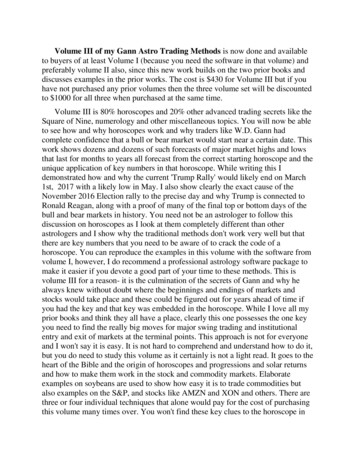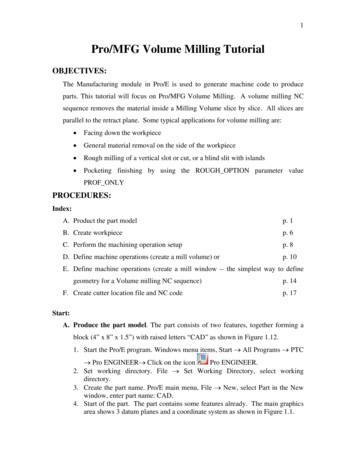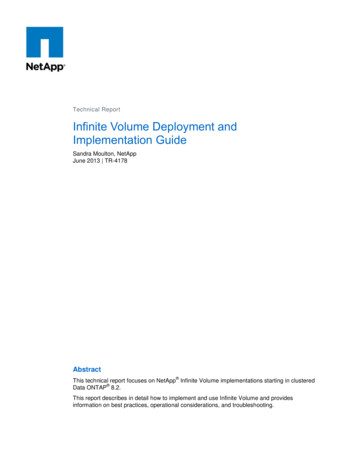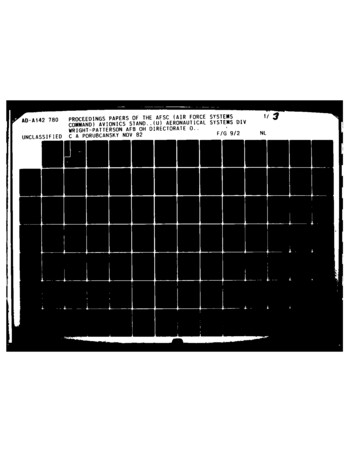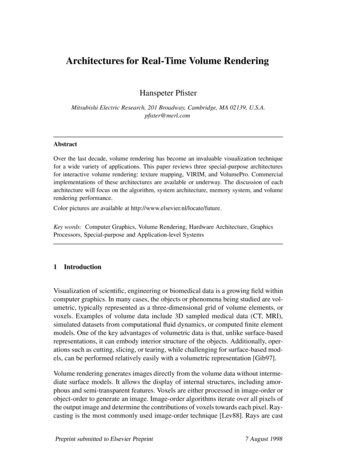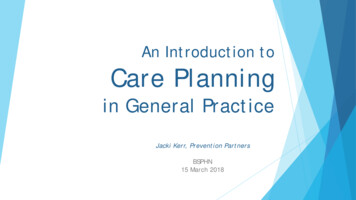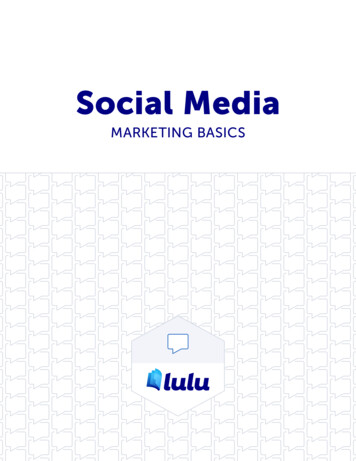
Transcription
Book ReviewsVolume IBook ReviewsVolume IByMark McGee1 of 81
Book ReviewsVolume I2 of 81ChaptersIntroduction3Mapping Apologetics5Reasons For Our Hope12Fool’s Talk18There Is No God26Rediscovering Jesus33Christianity On Trial42Hostile Environment49Truth In A Culture Of Doubt57Developing A Biblical Worldview65The Challenge Of Jesus72
Book ReviewsVolume I3 of 81IntroductionI began recommending Christian books to students decades ago for thepurpose of helping them know about some of the better resources availableto them. Many of the books were about Bible study, theology, discipleship,Church history and apologetics. The response was almost always positive,so I decided to review books online to help even more students know aboutbooks that would both inform and challenge. Most of the books I review arenew or of recent origin.Book Review Volume I is the first in a series about books on the primarysubject of “Apologetics” on FaithandSelfDefense.com. Another series youmay find helpful is A Reading Plan For Christian Apologists, also onFaithandSelfDefense.com.Our hope is that you will find books you can add to your Christian library —books that will become your friends and allies as you grow in the grace andknowledge of our Lord Jesus Christ.
Book ReviewsVolume I4 of 81
!Book ReviewsVolume I5 of 81
Book ReviewsVolume I6 of 81I want to begin this book review by saying ‘BUY IT!’ Okay, now to thereview.First, let’s meet the author: Dr. Brian K. Morley is professor of philosophyand apologetics at the Master’s College in Santa Clarita, California. He hasbeen a member of the Evangelical Theological Society, the EvangelicalPhilosophical Society, and the Society of Christian Philosophers. He is alsothe author of God in the Shadows: Evil in God’s World.Dr. Morley’s new book is titled Mapping Apologetics: ComparingContemporary Approaches (IVP Academic, 2015). He focuses on howpeople decide what to believe and poses the question this way: ‘How do weanswer life’s most important question–the one on which everything else inlife depends?” The subject of Morley’s book is the “foundational question ofapologetics, the matter of proof.”I strongly recommend that anyone interested in the “defense of thegospel” (Philippians 1:17) purchase this book and here’s why.
Book ReviewsVolume I7 of 81Foundational IssuesWhether you are an aspiring apologist or have been involved in apologeticsfor decades, the structure of Mapping Apologetics will serve you well for theremainder of your ministry life.Dr. Morley’s method begins with an excellent Chart of ApologeticApproaches. It begins with Fideism (defined by Morley as ‘a denial ofapologetics’) and moves through various apologetic approaches thatincrease emphasis on objective, independently existing evidence. Undereach of the ten approaches are five important aspects of the apologeticgroupings: Defining Characteristics Adherents Criticisms Epistemological staring point SummaryDr. Morley explained in his Introduction that he organized the bookaccording to a schema that he has used through much of his 25 years ofteaching apologetics. That is one of the major benefits of this book: havinga quarter century of apologetics’ classes poured into one great referencebook.‘I have also sought where possible to bring out the deeper, underlyingissues separating the views, most of which are philosophical, having to
Book ReviewsVolume I8 of 81do with issues such as the following: how we know, how we havecertainty (and how certain we can be); the relation between faith andevidence; the possibilities of reasoning by way of deduction, inductionand abduction; the role of assumptions and presuppositions; the relationbetween evidence and worldview; the validity of intuition as a way ofknowing and its possible divine origin; and whether we can know somethings without inferring them from other things we know (i.e.foundationalism). Through all this I hope to bring the issues into sharperfocus so as to facilitate more constructive dialogue on the subject ofapologetic methods.” Dr. Morley, Mapping Apologetics, IntroductionApologetic MethodologiesEven though Dr. Morley admits he was not able to give space to all of theprimary adherents of the various apologetic approaches in the book (384pages), he addresses some of the most important in each category. Someof the apologists that Dr. Morley wrote about in the book include CorneliusVan Til, John Frame, Alvin Plantinga, Mark Hannah, E.J. Carnell, FrancisSchaeffer, Richard Swinburne, William Lane Craig, Norman Geisler, JohnWarwick Montgomery and Gary Habermas.“I have tried to represent each thinker fairly, as they would describe theirviews. I have had the privilege of meeting and talking to most of those Ihave written about (including the late Greg Bahnsen), and whether bypersonal contact or only via their writings, I am glad to have beenexposed to such brilliant minds who have worked hard on these complexissues over a lifetime.” Dr. Brian Morley, Introduction
Book ReviewsVolume I9 of 81Because Mapping Apologetics compares contemporary approaches, manyof the apologists Dr. Morley wrote about in his book were able to respondto him:“Dr. Morley is a careful scholar who does assiduous research andpainstaking analysis.” Mark M. Hanna, Professor of Philosophy atVeritas Seminary“Mapping Apologetics provides the most complete and best analysis todate of my overall apologetic approach.” John Warwick Montgomery,Distinguished Research Professor of Philosophy, Concordia University,Wisconsin; Director of the International Academy of Apologetics,Evangelism and Human Rights, Strasbourg, France“Brian Morley shows mastery of the details of my approach, includingthe qualifications and nuances.” John Frame, Professor of SystematicTheology and Philosophy, Reformed Theological Seminary“In the volume Mapping Apologetics, Brian Morley treats the reader to anoverview and examination of several very useful apologetic methods fordefending the Christian faith.” Gary R. Habermas, DistinguishedResearch Professor and Chair, Department of Philosophy, LibertyUniversity and Baptist Theological Seminary
Book ReviewsVolume I10 of 81SummationIf you are new to apologetics, Mapping Apologetics will help youunderstand the many ways Christians are defending the faith around theworld today. Dr. Morley’s writing is so clear and thorough that you shouldalso be able to identify the type(s) of apologetics that fits the way you think.You can use that knowledge to continue your apologetics education andbroaden opportunities for impacting the lives of people God will bringacross your path.If you have been involved in apologetics for many years, MappingApologetics will help you dive deeper into your particular apologeticmethodology. Dr. Morley does a great job pointing to many books and otherreferences that will help you understand how to use your gifts in evengreater ways to reach people for Christ and bring glory to God.If you are interested in Christian apologetics, Mapping Apologetics isdefinitely a must-have book for your library.Mapping Apologetics: Comparing Contemporary Approaches, By Brian K.Morley, InterVarsity Press, 2015
Book ReviewsVolume I11 of 81
Book ReviewsVolume I12 of 81
Book ReviewsVolume I13 of 81Reasons For Our Hope: An Introduction To Christian Apologetics by H.Wayne House and Dennis W. Jowers (B&H Academic, 2011) is a MUST forevery Christian’s bookshelf. As Normal Geisler wrote in the Foreword to thebook – “Never before has apologetics been needed more.”Building an apologetics library that works in the real world of ‘faith defense’is an important task for every Christian – especially parents and others whowork with children, teens and young adults.Reasons For Our Hope is a wonderful resource that addresses multipleaspects of Christian apologetics and is easy to use. The authors, who areboth professors, bring the best of their seminary classes to this amazingdocument.Dr. H. Wayne House (M.A., Th.D., J.D.) is distinguished research professorof Theology, Law, and Culture at Faith Evangelical Seminary in TacomaWashington. He taught at Trinity Law School of Trinity InternationalUniversity and is a past president of the Evangelical Theological Society.Good credentials for someone writing a book about Christian apologetics.Dr. Dennis W. Jowers (M.Th., Ph.D.) is professor of Theology andApologetics at Faith Evangelical Seminary in Tacoma. Also goodcredentials for writing a book about Christian apologetics.
Book ReviewsVolume I14 of 81The authors divided Reasons For Our Hope into four major sections:1.Apologetic Methodologies and Systems2.Apologetics In Scripture And In History3.Apologetic Problems4.How To Use Apologetics In Engaging The WorldI was impressed in reading the book by how thorough and in-depth theauthors were in presenting the vast amount of apologetics material. Theywrote what is seminary-level information in a way that most Christians willfind interesting, clear and easy to understand.Reasons For Our Hope covers every important aspect of Christianapologetics, so it’s like having several topical books in one cover. Here aresome of the subjects covered in the book: Introduction to Apologetics Worldviews Approaches to Apologetics Categories of Apologetics How Do We Know the Truth? The Tension Between Faith and Reason Natural Theology and Its Contribution to Apologetics Speaking About God and Ultimate Reality Apologetics in the Old Testament Apologetics in the New Testament
Book ReviewsVolume I15 of 81 Early Apologists of the Second and Third Centuries Later Patristic and Medieval Apologetics Apologetics of the Reformers Enlightenment and Post-Enlightenment Apologetics Contemporary Apologetics Use of Philosophy in Apologetics Skepticism and Its Cure Postmodernism and Defense of Christianity The Knowledge of God The Problem of Evil Can Miracles Occur and Do They? How Reliable Are the Sources for Christian Truth? Answering the Challenges of the Jesus Quests The Meaning and Importance of the Physical Resurrection of Christ The Compatibility of Biblical Truth and Modern ScienceAfter giving detailed insight into the history of apologetics and variousproblems that Christians face in presenting the Gospel, the authors share awealth of information about how to use apologetics in engaging cultists,secularists, postmodernists, Muslims, and new age mysticism.I highly recommend Reasons For Our Hope: An Introduction to ChristianApologetics for every Christian interested in both understanding and usingapologetics to reach unsaved family, friends, neighbors and co-workers. It’salso a great guide for Christian parents to use in preparing their children tolive in an ever-expanding secular society.
Book ReviewsVolume I16 of 81“Few contemporary books on the topic are more comprehensive, moresystematic, better documented, or better illustrated than this one.”Norman L. Geisler, Ph.D., Professor of Apologetics, Veritas EvangelicalSeminary“Drs. House and Jowers have done a wonderful job at providing, in asingle volume, a full-orbed education in the defense of the faith. Wehaven’t seen a book like this in a long time that delves into thedefinitions, the methodology, the history, the issues, and the practice ofthis crucial but neglected field of Christian Apologetics.” Craig J. Hazen,founder/director, Graduate Program in Christian Apologetics, BiolaUniversity“The book’s real strength lies in its treatment of apologetic methodologyand the biblical and historical basis of apologetics. It is a delight to seethis book published, and I hope it gets into the hands of those who wantto know the reasons for our hope.” J. P. Moreland, distinguishedprofessor of Philosophy, Talbot School of TheologyAs I mentioned at the beginning, this is a MUST for every Christian’sbookshelf. If you can afford to purchase only a few books aboutapologetics, be sure to purchase this one. If you can afford to purchasemany books about apologetics, be sure to purchase Reasons For OurHope.Reasons for Our Hope: An Introduction to Christian Apologetics(Hardcover), By H. Wayne House, Dennis W. Jowers, B&H Academic, 2011
Book ReviewsVolume I17 of 81
Book ReviewsVolume I18 of 81
Book ReviewsVolume I19 of 81Os Guinness wrote in his new book, Fool’s Talk: Recovering The Art OfChristian Persuasion (IVP Books, 2015), that his own journey to faith wasmore than intellectual. He said it included a long, slow, critical debate in hismind during his school years.“On one side, I listened to the arguments of such famous atheists asFriedrich Nietzsche, Jean Paul Sartre and Albert Camus, and on theother side to such Christian thinkers as Blaise Pascal, FyodorDostoevsky, G.K. Chesterton and C.S. Lewis.”Guinness began writing books more than 40 years ago (The Dust of Death:A Critique of the Establishment and the Counter Culture, and the Proposalfor a Third Way) and quickly became known as one of the best thinkers inChristianity. He went on to write more than 30 books (e.g. The Call, DoingWell and Doing Good, The Devil’s Gauntlet, Dining with the Devil, Time forTruth, In Two Minds, God in the Dark, Unspeakable, A Free People’sSuicide, The American Hour, Long Journey Home, The Case For Civility,The Global Public Square, Renaissance: The Power Of The GospelHowever Dark The Times) while working as a freelance reporter with theBBC, as a visiting fellow at the Brookings Institution, and as a guest scholarat the Woodrow Wilson Center for International Studies. He is also thefounder of the Trinity Forum and project director of the Trinity Forum StudySeries and was the lead drafter of the Williamsburg Charter and the GlobalCharter of Conscience. Guinness is currently a Senior Fellow at the OxfordCentre for Christian Apologetics.
Book ReviewsVolume I20 of 81Dr. Guinness (DPhil, Oxford University) is known around the world as aninfluential speaker, social critic and thought-provoking writer. So, with allthat he’s already said, what else can he possibly write that Christiansshould read?In Fool’s Talk, Os Guinness turns to what may be the most importantsubject for Christians to consider, especially Christians who think ofthemselves as ‘apologists.’ That subject is Persuasion.“We are all apologists now, and we stand at the dawn of the grand ageof human apologetics, or so some are saying because our wired worldand our global era are a time when expressing, presenting, sharing,defending and selling ourselves have become a staple of everyday lifefor countless millions of people around the world, both Christians andothers. The age of the Internet, it is said, is the age of the self and theselfie. The world is full of people full of themselves. In such an age, ‘Ipost, therefore I am.’ (Introduction, Fool’s Talk, p. 15)Guinness raises an important question for Christians to consider. Withhuman interconnectedness in the global era raised to a truly global level,with unprecedented speed and on an unprecedented scale, ‘are Christiansready for this new age?’ Are Christians prepared to persuade people whoare closed, indifferent, hostile, skeptical or apathetic?
Book ReviewsVolume I21 of 81“Loss of persuasion? It might seem bizarre, almost unimaginable, thatChristian communication has lost something so central to its mission.Yet in profound ways it has, and that is why our challenge is to thinkabout apologetics in ways that are not only fresh but faith andindependent–faithful in the sense that they are shaped by theimperatives of Christian truths, and independent in the sense that theyare not primarily beholden to ways of thinking that are alien to Christianways of thinking.” (Fool’s Talk, p. 18)One of my favorite chapters in Fool’s Talk is Chapter 6 – ‘Turning TheTables’. Guinness quotes from G.K. Chesterton’s dramatic story of InnocentSmith and the philosophy professor in the book Manalive (Arc Manor, LLC,2008, original publication 1912), then launches into two pitfalls that awaitevery Christian intent on serving God. The pitfalls come from therelationship of apologetics and evangelism.“ in the overall task of Christian advocacy, we have to face up to twoequal and opposite errors. One is the apologist’s temptation, which is toemphasize apologetics at the expense of evangelism, and the other isthe evangelist’s temptation, which is to do the opposite and emphasizeevangelism at the expense of apologetics.” (Fool’s Talk, p. 110)
Book ReviewsVolume I22 of 81Guinness goes on to explain that the two tasks (apologetics andevangelism) ‘should be joined seamlessly.’ He wrote that the isolation ofapologetics from evangelism is the ‘curse’ of much modern apologetics,‘and why it can become a sterile and deadening intellectualism.’ Guinness’conclusion is that whenever apologetics is needed, it should precedeevangelism, but must always lead directly to it (evangelism). ‘The work ofapologetics is only finished when the door to the gospel has been openedand the good news of the gospel can be proclaimed.’You may be wondering why Guinness titled his new book, ‘Fool’s Talk.’ Hereferred to a tiny silver donkey sitting on his desk. Guinness wrote that thedonkey reminded him of the proper role of the apologist.“Balaam’s ass is the patron saint of apologists. Madness, as we shallsee, is an appropriate term for the unreality of unbelief. In order tocounter it, we play our part, and we do the best we can. But even whenour efforts are serviceable, our role is always humble and all too ofteninadequate and somewhat ridiculous. Christian advocates whounderstand their calling would never be too big for their books. The tai isnot about us. It’s all about him [God], and he may be trusted to do whatmatters.” (Fool’s Talk, p. 60)
Book ReviewsVolume I23 of 81What do other apologists think of ‘Fool’s Talk’?“In this landmark work, I am thrilled to see Os’s unique thinking on thesecrucial subjects, co-extensive with a lifetime of doing apologetics. It is amust-read for anyone interested in engaging the skeptic or seeker. Fewthinkers today rise to the level that Os does, even as he plumbs thedepth of vital issues in defense of the historical Christian faith.” RaviZacharias, author and speaker“A remarkable book. Written with the benefit of decades of experienceand reflection — this is one book on apologetics you will not want tomiss. I wholeheartedly recommend it.” Michael Ramsden, Joint Director,Oxford Centre for Christian Apologetics, International Director, RZIM forEurope, the Middle East and Africa“Hardened skeptics and militan unbelievers are often a puzzle toChristian apologists. Arguments alone sometimes fail to stick to thesouls of these unbelievers. Because of this, we need the rhetoricalwisdom of Os Guinness, evangelicalism’s greatest living social critic.Fool’s Talk will make its readers wiser and more creative in commendingthe matchless gospel of Jesus Christ.” –Douglas Groothuis, Professor ofPhilosophy, Denver Seminary
Book ReviewsVolume I24 of 81Thank you, Dr. Guinness. May we all recover the ‘art of Christianpersuasion.’Fool’s Talk: Recovering the Art of Christian Persuasion, IVP Books, 2015,hardcover, 270 pages
Book ReviewsVolume I25 of 81
Book ReviewsVolume I26 of 81
Book ReviewsVolume I27 of 81There Is No God – Atheists In America by David Williamson and GeorgeYancey (Rowman & Littlefield, 2013) is one of the better presentations ofwhat atheists think, believe and want.I spent some time as an atheist in the 1960s and early 70s and have talkedwith scores of atheists in the years since. What Williamson and Yanceyhave presented from their research has a strong ring of truth about whatatheists think, believe and want concerning religion and an expandingsecular society, especially as it relates to government, politics andeducation.One of the unique aspects of There Is No God is the inclusion ofmany quotes from atheists about important issues of our day: same-sexmarriage, abortion, separation of church and state, and public schoolcurricula, to name several. Reading what atheists think on these subjects intheir own words should be helpful to anyone who wants to understandatheists and reach them for Christ.Understanding AtheismDavid Williamson and George Yancey are professors of sociology at theUniversity of North Texas. They begin their book with a chapter on‘Understanding Atheism in the United States’ and follow with ‘A Brief Historyof Atheism.’ These chapters are helpful in understanding atheism fromancient times to how atheists organized for action in the 20th and early 21stcenturies.
Book ReviewsVolume I28 of 81Christians often tell me they’ve never met an atheist and don’t understandthem. One of the most helpful aspects of There Is No God – Atheists InAmerica is the authors introduce readers to atheists by sharing their firstname, age, sex and education. That helps demonstrate that atheists arereal people with real lives, hopes and dreams for their future and the futureof society.The authors first introduce the atheists in their survey by how they becameatheists. Many were raised in religious home or were exposed to religion aschildren. Quite a few of them who admitted to having religious beliefs aschildren said they “lost their beliefs, at least in part, due to their experiencesin colleges or universities” (p. 43). Another interesting research finding wasthat almost two-thirds of the atheists the professors interviewed stated thatthey “never had any doubts about their atheism” (p. 44).It will come as no surprise that the vast majority of atheists surveyedviewed religious people as ‘irrational.’ The authors summarized atheistthinking this way: “atheists do not tend to rely upon positive arguments foratheism. Rather, they tend to point out what they perceive as the illogicalthinking of people of faith.” I would agree with that based on my experienceas an atheist.
Book ReviewsVolume I29 of 81Quoting AtheistsHere are a few quotes from some of the atheists Williamson and Yanceyinterviewed about how they view Christians and irrationality.“The Christian probably just accepted his creed through tradition, fearand conformity, which I find weak and illogical.”“Accepting things without evidence, in other words, faith or dogma,encourages people to accept things irrationally, which leads to harmingothers.”“Religious people are susceptible because they are groomed not toquestion and to dedicate their lives to a ‘higher power,’ a power that isutterly silent (whether or not ‘God’ is deaf, he is without a doubt dumb).”Quoting atheists is a strong point to There Is No God – Atheists In America.If you’re not familiar with atheist thinking, you will find this book eyeopening. If you are familiar with atheist thinking, you will find the bookinsightful and helpful in talking with atheists about God and the Christianworldview.
Book ReviewsVolume I30 of 81ContentsThe book is filled with great information and guidance into understandingatheists that you can read in just a few hours. The chapter contentsinclude:1.Understanding Atheism in the United States2.A Brief History of Atheism3.Who Are the Atheists?4.The Foolishness of Religion5.Progressive Politics as a Tenet of Atheism6.Toward an Atheist Morality7.Atheism in the United States8.Summary and ConclusionReviews“Religious people assume that the growing atheist minority in Americalacks a sense of morality. There Is No God gives a voice to committedatheists who have a strong moral compass, pointing not toward God butin the direction of rationality and humanism.” Ariela Keysar, Co-PrincipalInvestigator, American Religious Identification Survey, Trinity College
Book ReviewsVolume I31 of 81“David A. Williamson and George Yancey have successfully walked thefine line between the two extremes of the religious-atheism divide. Theauthors’ messages are honest, thoughtful, and respectful of the peopleand points of view along the continuum of those with absolute god belief,absolute no-god belief, and variations in between.” Raymond F.Paloutzian, Professor Emeritus of Psychology at Westmont College:Editor of the International Journal for the Psychology of Religion“Williamson and Yancey ably integrate the sociology of religion with thepolitical sociology in an insightful analysis of contemporary atheistAmericans, a largely unknown and under researched minority.” Barry A.Kosmin, Director, Institute for the Study of Secularism in Society &Culture, Trinity CollegeSpeaking as a former atheist who communicates with atheists every dayabout atheism, theism and the Christian worldview, this is a wonderful bookto have in your library. It’s even more wonderful to read, study and useinformation in the book to minister to atheists in your family andneighborhood, at work and school.There Is No God – Atheists In America, Roman & Littlefield Publishers,2013, Hardcover, 150 pages
Book ReviewsVolume I32 of 81
Book ReviewsVolume I33 of 81
Book ReviewsVolume I34 of 81“Rediscovering Jesus: An Introduction to Biblical, Religious and CulturalPerspectives on Christ” (IVP Academic, 2015) will get you thinkingseriously about how both Christians and non-Christians view Jesus Christ.The authors (David B. Capes, Rodney Reeves and E. Randolph Richards)present a variety of views about Jesus from both biblical and non-biblicalperspectives. They include the views of several individuals and groupsincluding each of the Gospel writers (Matthew, Mark, Luke, John), theApostle Paul, the Gnostics, Muslims, Mormons, Liberals, Jesus Seminar,and Americans.Which one is right? Which view answers this questionbest: “Who is your Jesus?”“Rediscovering Jesus” is an IVP Academic textbook, which may seem alittle intimidating tonon-academics, but I found the content and writingstyle to be at a level that most older Christian teens and adults would findcomfortable and helpful. The authors are all Christian professors who haveprevious writing experience.David B. Capes (PhD, Southwestern Baptist Theological Seminary) isprofessor of New Testament in the School of Christian Thought at HoustonBaptist University, where he was founding dean of the Honors College. Hehas authored, coauthored or coedited books such as Rediscovering Paul,Old Testament Yahweh Texts in Paul’s Christology, The Footsteps of Jesusin the Holy Land, The Last Eyewitness, Rebecca’s Children, The Voice ofHebrews and The Voice of Romans.
Book ReviewsVolume I35 of 81Rodney Reeves (PhD, Southwestern Baptist Theological Seminary) is deanof The Courts Redford College of Theology and Ministry and professor ofbiblical studies at Southwest Baptist University, both in Bolivar,Missouri. Previously a pastor with churches in Arkansas and Texas, Reevesis author or coauthor of A Genuine Faith: How to Follow Jesus Today,Spirituality According to Paul: Imitating the Apostle of Christ andRediscovering Paul: An Introduction to his World, Letters and Theology. Hisarticles have appeared in journals such as Perspectives in ReligiousStudies, Biblical Illustrator, Southwestern Journal of Theology andPreaching.E. Randolph Richards (PhD, Southwestern Baptist Theological Seminary)is dean and professor of biblical studies in the School of Ministry at PalmBeach Atlantic University. He is a popular speaker and has authored andcoauthored dozens of books and articles including Rediscovering Jesus,Misreading Scripture with Western Eyes, Rediscovering Paul, The Story ofIsrael and Paul and First-Century Letter Writing.They did a wonderful job presenting each perspective about Jesus intoclear view and asked how each view is different than other views and whatif each of the views were our only Jesus. That will get you thinking. Eachchapter also includes more reading material and discussion questions,which are excellent for small groups as well as college classrooms.
Book ReviewsVolume I36 of 81I especially enjoyed the chapter about “The American Jesus” becausethat’s the Jesus I’ve seen taught and touted since I was a young child in themid-20th century. We’ve seen the politically correct Jesus, the politicizedJesus, the Prince Charming Jesus, the pragmatic Jesus, the radical Jesus,and the Superman Jesus during the past 70 years. Then, on top of that, wehave the ‘Cinematic Jesus.’ That’s the Jesus Hollywood has presented indozens of movies and TV programs during the past 100 years. I agreewith the authors when they wrote, “It shouldn’t surprise anyone, but theAmerican Jesus really isn’t about Jesus at all.”ContentsPart IIntroduction: Jesus in the Bible1. Mark’s Jesus2. Matthew’s Jesus3. Luke’s Jesus4. John’s Jesus5. Paul’s Jesus6. The Priestly Jesus7. The Jesus of Exiles8. The Apocalyptic Jesus
Book ReviewsVolume IPart IIIntroduction: Jesus Outside the Bible9. The Gnostic Jesus10. The Muslim Jesus11. The Historical Jesus12. The Mormon Jesus13. The American Jesus14. The Cinematic JesusConclusion: “Our Jesus”Subject IndexScripture Index37 of 81
Book ReviewsVolume I38 of 81Reviews“The more Jesus we present the more gospel we present.Rediscovering Jesus is on that list of what I can enthusiasticallyrecommend that is pure gospel!”—Scot McKnight, Julius R. ManteyProfessor of New Testament, Northern Seminary“Rediscovering Jesus is an accurate, readable and eye-opening accountof the diverse perspectives on Jesus found in the New Testament and inother religious and cultural contexts Capes, Reeves and Richardshave produced a remarkably fresh, enlightening and convictingvolume.”—Mark L. Strauss, Bethel Seminary, San Diego“Rediscovering Jesus is like an expert journalist or photographerexamining the subject—in this case, Jesus—from all sides and angles Few textbooks do as good of a job as this one in helping studentsengage with Jesus’ question ‘Who do you say that I am?'”—Nijay Gupta,assistant professor of New Testament, George Fox EvangelicalSeminary“Making Jesus in our own image—a dangerous temptation. Capes,Reeves and Richards provide the antidote in th
books that will become your friends and allies as you grow in the grace and knowledge of our Lord Jesus Christ. Book Reviews Volume I 4 of 81. Book Reviews Volume I 5 of 81! Book Reviews Volume I 6 of 81 I want to be

